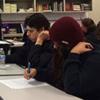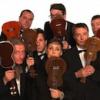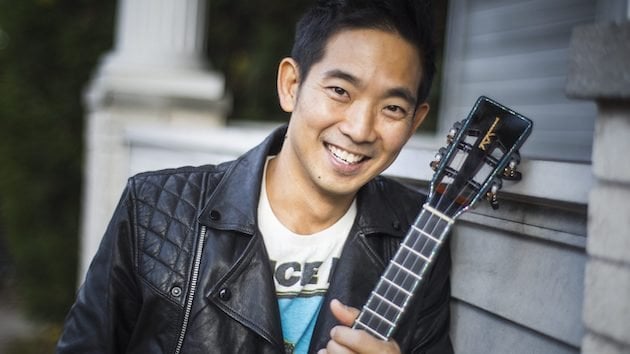
Ukulele virtuoso Jake Shimabukuro’s greatest success is not anchored in his multiple music awards, dozens of albums, an award-winning documentary made about him in 2012, media appearances, sold-out performances, or the YouTube video anonymously posted in 2006 that had him playing George Harrison’s “While My Guitar Gently Weeps.” The video went viral, rocketed him to international attention, and earned him the label “the Jimmy Hendrix of the ukulele.”
Instead, in a phone interview from his home in Hawaii, he says his greatest reward comes when a person he has introduced to the ukulele, upon waking up in the morning, reaches first for the instrument to strum a few chords.
A recent opportunity to create ukulele video lessons for the MasterClass streaming platform series, allows Shimabukuro to spread the joy of playing a ukulele worldwide. “It gave me an opportunity to relay what other musicians and teachers shared with me to more people,” he says. “There’s a Japanese phrase, “Okage sama de” (I am what I am because of you). MasterClass was a way to honor all the people who inspired me and to pass the information along.”
A conversation with Shimabukuro is fascinating, especially as it is underscored by a low, resonant hum that occasionally emanates from his most inner core when he is struck by a question’s depth or thoughtfully considering his response.
Tell me how Covid is impacting your life as a musician, as a father, as an artist?
I have two boys, ages 8 and 5. It’s greatly impacted our planet. Every family and every community has its own set of challenges. The hardest part is things change so quickly, week-to-week, day-to-day. Important with our family is to try to stay flexible, adapt quickly, and positively. One of the biggest changes for me is the last 20 years of my life I’ve always been traveling and on the road. Since March, that has completely stopped. I’ve never been home in Hawaii this extended a period of time. The silver lining for me is getting to spend time with my boys, my wife, my family.
The immense thing, talking with musician friends, is that we’re seeing by not traveling that you adopt a different mindset. I’ve been able to be the father I’ve always wanted to be, the husband I’ve wanted to be. I’ve learned how to cook better, be more handy around the house. With my kids, it’s being able to be there for them. To read to them, make them do homework, teaching them music.
As for music, I have to be honest. The first few months it was hard to get into a creative headspace to write music. But in the last month I’ve been able to write and record new music. I’m kind of in that mindset of accepting the situation, adopting a good routine to keep our family and community safe. We’ve had more consistency, so I’ve been able to refocus on bringing music back.
Has the social justice, BLM movement filtered into your creative output, your choices as a collaborator, or otherwise?
It’s been scary watching television and the news and seeing what’s going on around our country. It’s been heartbreaking and an emotional time for a lot of people. I can’t imagine what it must be like in those places where it’s right in your neighborhood. In Hawaii, I feel we are in the middle of the ocean, a little away from it. Things like the rioting and fires and the shootings and violence, I feel I’ve been sheltered. It’s overwhelming and it’s hard to imagine what it must be like for kids who are actually living in those neighborhoods. It would be devastating if I lived with my kids there. This is a time where people’s emotions are so high.
Later, returning to the topic, he says:
I [am unsure] how to answer those questions because a lot of it, I don’t have the firsthand experience. I always want to be respectful. It’s just been weighing heavily to see what’s happening. These cities are places I used to go to every year. People need to see positive things: In Hawaii, through all of this, people come together, do food distributions. Volunteers do things as a community; it lifts your spirit. So sometimes when I see little gems like that, a part of me feels like I shouldn’t be so positive with what people are suffering. I hesitate to share too many things because I want to keep balance. It’s hard to navigate. Either way, you’re being honest, but which direction do you focus on because you want to be sensitive? I don’t even look at social media, because there’s so much potential for destruction of relationships.
In response to the tension, do you find yourself writing music that sends a counter or calming message?
It’s funny because of course, playing the ukulele and being a musician, I always want to create music that brings joy or peace. That’s the reason I am playing. The ukulele is one of the instruments of peace; people aren’t intimidated by it. It’s the instrument for everyone. I really do believe as silly as it sounds, that if everybody learned the ukulele, the world would be a better place. The instrument brings out a different side of people. When you can play an instrument for fun, enjoyment, relaxation, as an escape, you have an outlet to be your own therapist or deal with certain emotions that may be building up inside of you. I love how it brings people of all ages, demographics and walks of life together.
Talk to me about the newest album, Jake Shimabukuro Trio, and the contrasts you experience when collaborating with other musicians versus recording or touring solo repertoire.
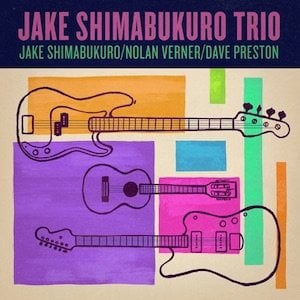 With this record, I approached it with a collaborative mind. Going into the studio I was open to my partners’ ideas. I would encourage them to throw out melodic ideas where in the past I would write the songs, come up with arrangements, and present the charts and they’d play something and I’d say, “oh no, let’s change this to that.”
With this record, I approached it with a collaborative mind. Going into the studio I was open to my partners’ ideas. I would encourage them to throw out melodic ideas where in the past I would write the songs, come up with arrangements, and present the charts and they’d play something and I’d say, “oh no, let’s change this to that.”
I wanted them to have their identity on each song. I had the trust and the unspoken agreement that what they felt they would bring to the song, I’d be open to it. I wanted them to feel they had their thumbprint on every track. We laughed so much in the studio that everyone felt great about taking that leadership role when it was time.
It has a different character to it. A flavor and feeling I’ve never had before. I can hear their personalities in the songs.
When I’m performing live by myself, a lot of the decisions are not just mine. I’m heavily influenced by the audience; they’re like my band members. I’m sensitive to how they are feeling and internalizing: I use them as a gauge to set tempo or how long I hold a note, my song selections or the length of a song. Sometimes I’ll cut it short because I feel like I’m losing that connection. You want to feel that pressure. If they push, I lean back; if they lean back, I press forward. That way we are constantly engaged.
One of the funny things is we recorded this album in early 2019. We were throwing out song titles but when all this happened in March (2020) after the album came out, we thought it was so weird. We had When the Masks Come Down. I don’t even know how we came up with that, but I remember we were thinking more of planes, when the oxygen masks come down. There’s turbulence and uncertainty, an idea before the pandemic. We have Lament, Strong in the Broken Places ... it’s strange how the song titles could be relatable to what we’re going through now.
Do you think there’s more facets of the ukelele to explore? Do you want to dive back into electronics of digital manipulations or retreat into more traditional acoustic rep?
I will say that recently I’ve been more satisfied just playing acoustically, I’ve been embracing the natural sound. It’s strange, I don’t feel much desire to plug into pedal board, or my rack, or amplify. I just love the natural sound and that was how I played as a kid. Then I got into digital effects and manipulating the tone and went too far, brought back the acoustic sound, then started bringing back the pedals and digital effects. Recently, I’ve been wanting to hear the instrument by itself.
You combine genres on the ukulele: Is it harder to integrate music influenced by classical music or jazz or rock?
They all have their own challenges. Even traditional Hawaiian music has its own set of challenges. People might think traditional Hawaiian music is melodically and harmonically not as complicated as classical music or jazz. But there’s a certain swing that’s difficult to play. You can have all the chops in the world ... but sit down with traditional musicians and you’ll stick out like a sore thumb.
Obviously, classical music and jazz are complex when it comes to harmony, melodic ideas, variations, and relationships. There’s a reason for every note and group of notes. I respect all genres because even studying music of other cultures, like Japanese music and even music of Okinawa, it’s very complex: the subtle nuances, silence between notes, phrasing — it’s very deep.
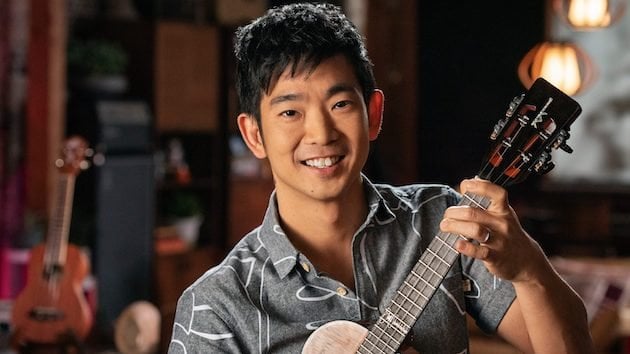
Tell me about your MasterClass series debut.
I’ve been a huge fan of MasterClass. Early last year, I’d been hearing a lot about it and a friend of mine said he’d watched Herbie Hancock’s MasterClass. I started doing research on it and I saw Hans Zimmer, Danny Elfman. My mind was blown. I couldn’t believe the roster. In 2019, I was home for a couple weeks so I subscribed. I dug into Danny, Santana, Zimmer, Tom Morello, Christina Aguilera, Itzhak Perlman, all the music ones. Each one, I was so inspired by the end of the lesson. Some I watched multiple times and then I watched Malcolm Gladwell. I found so many things I could apply. It opened this whole world to me, even though I’ve been saying it my whole life that you can learn from anybody.
After I became a subscriber and was watching it a lot, my manager called me up and said, have you ever heard of MasterClass? They want you to do one. It’s such an honor. I was doing shows in L.A. and in February we set aside a couple of days to shoot MasterClass. They were amazing, with a crew of 50 people. It felt like shooting a Hollywood movie.
Do you learn something unique about the ukulele by teaching?
Before I started touring, I had a ukulele school. I love teaching people. Not necessarily teaching music but teaching the joy of music. Getting people exited. With MasterClass we do lots of technique and chords, but my focus is getting people playing right away. I want them to feel after one or two episodes they can play and make music. I love witnessing when people have that epiphany, that “oh my gosh, I never thought I’d be able to play an instrument or a song.” So many people shy away from music because they feel they’re not talented or need a special gift to play music. With ukulele, you don’t need to be a musician. I’m not disrespectful to the instrument, I wish people had that perspective to all instruments, to not be intimidated. The oboe or cello or violin or even guitar, it takes a lot of time and commitment before you can even make a sound or play something nice to listen to.
Teaching, I learned through the whole experience how terrible I am at explaining things. That’s a gift in itself. There’s a whole MasterClass [by Neil deGrasse Tyson] on presentation and getting ideas across. I have patience and make things fun, but it’s hard; you stumble over your words. Music is all about communication, so it was humbling. Here I am trying to do a class and I can’t even communicate my own ideas.
Do you have a dream project?
Yes, my hope and dream is to write a ukulele concerto. That would be the ultimate goal, to write a piece for ukulele and full orchestra in a traditional, classical way. I had the opportunity to play in a contemporary piece, composed by classical Hawaiian Byron Yasui, commissioned in 2010 by the Hawaiian Symphony Orchestra. It was amazing. I had an intense six months to learn it. It was the first time I worked with a music coach to play the pseudo-orchestra parts. Learning the atonal ukulele parts out of context was a challenge for me. I’d love to write my own piece.



